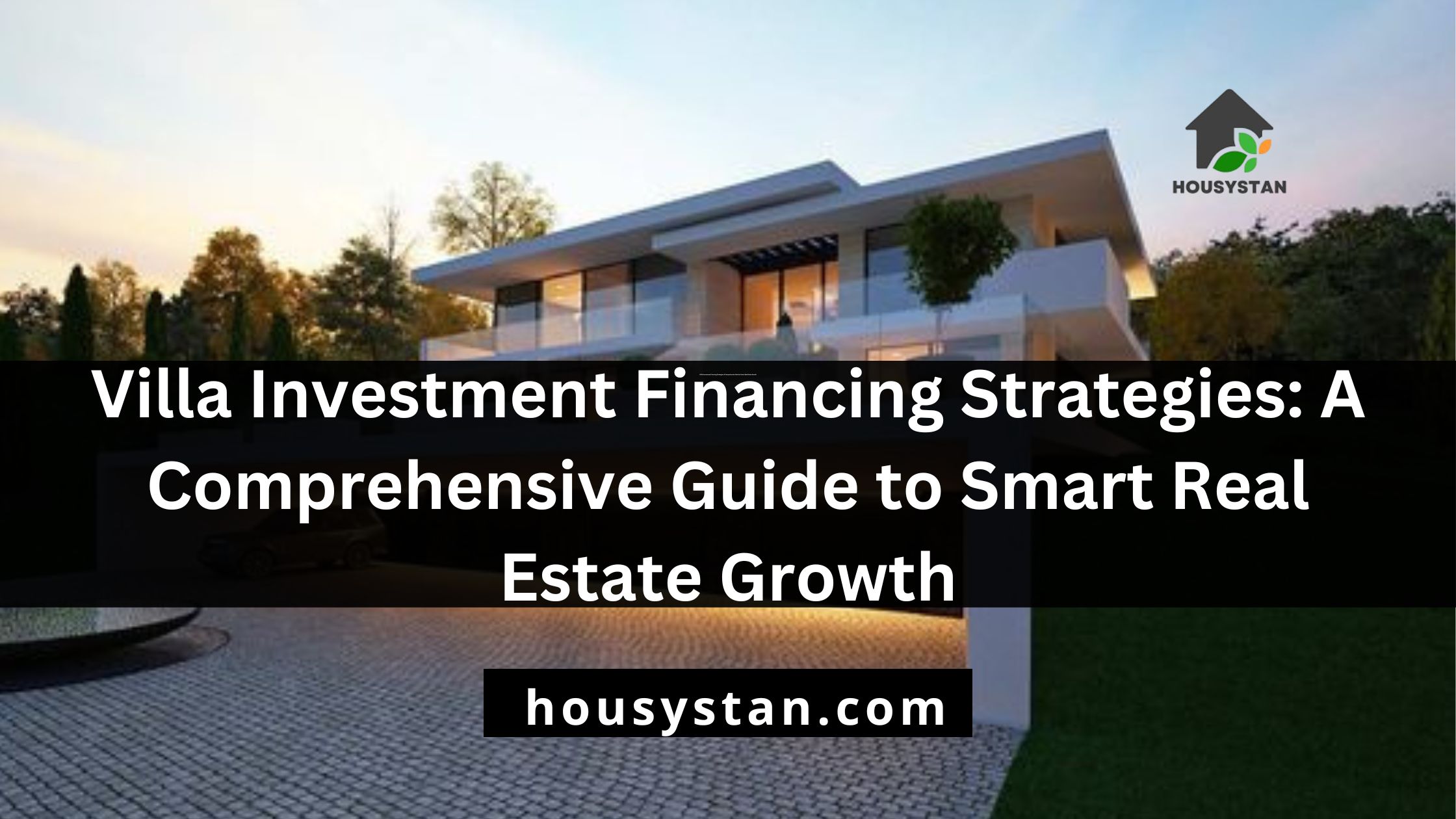Villa Investment Financing Strategies: A Comprehensive Guide to Smart Real Estate Growth
Read latest blogs and articles from Housystan

The Information mentioned here was last updated on:
21/2/2026Villa Investment Financing Strategies: A Comprehensive Guide to Smart Real Estate Growth
Introduction: Unlocking the Potential of Villa Investment
In the evolving landscape of real estate, villa investments have emerged as a lucrative opportunity for both seasoned investors and newcomers seeking stable long-term returns. The allure of spacious living, exclusivity, and high potential for appreciation makes villas a prized asset. However, navigating the intricate world of villa investment financing requires a strategic approach. This comprehensive guide explores smart financing methods, essential considerations, and actionable tips to maximize your villa investment growth.
- Verified Tenants/Buyers
- Unlimited Property Listing
- Zero subscription/charges fee
Understanding Villa Investment: Why Villas Stand Out
Villas offer a unique blend of luxury, privacy, and capital appreciation that sets them apart from other property types. Whether located in urban hotspots or serene suburban enclaves, villas appeal to high-net-worth individuals and families seeking an elevated lifestyle. The limited supply, coupled with increasing demand, makes villa investment a robust addition to any diversified real estate portfolio.
Key Benefits of Investing in Villas
1. Potential for Higher Returns: Villas often appreciate faster than apartments due to their exclusivity and land value.
2. Rental Income Opportunities: Premium villas attract long-term tenants and lucrative vacation rental markets.
3. Asset Diversification: Including villas in your portfolio reduces risk and enhances stability.
4. Lifestyle Value: Owners enjoy spacious environments, private amenities, and enhanced security.
Assessing Your Financial Readiness
Before diving into villa investment, it’s crucial to assess your financial standing. Calculate your net worth, evaluate your debt-to-income ratio, and determine how much capital you can allocate without jeopardizing your financial security. Ensure you have an emergency fund and a clear understanding of your risk tolerance.
Financing Options for Villa Investments
Securing the right financing is pivotal to successful villa investment. Multiple options cater to different investor profiles and market conditions. Below are the most common and effective financing strategies:
1. Traditional Mortgages
Conventional home loans from banks or financial institutions remain the go-to option for many investors. They typically offer competitive interest rates and flexible repayment terms. However, lenders may require larger down payments for luxury properties like villas and may have stricter eligibility criteria.
2. Home Equity Loans and Lines of Credit
If you own existing property, leveraging your home equity can be a smart move. Home equity loans or lines of credit provide access to substantial funds at relatively low interest rates, allowing you to seize villa investment opportunities without liquidating other assets.
3. Joint Venture Partnerships
Pooling resources with trusted partners or investors can ease the financial burden and maximize investment potential. Joint ventures allow you to share risks, responsibilities, and profits while expanding your investment reach.
4. Private Lenders and Alternative Financing
Private lenders, non-banking financial companies, and crowdfunding platforms offer alternative funding solutions. These options may come with higher interest rates but provide flexibility in terms of eligibility and repayment schedules, making them ideal for investors with unconventional profiles or time-sensitive deals.
5. Developer Financing
Some villa developers offer in-house financing options to attract buyers. These schemes might feature lower down payments, deferred EMIs, or tailored payment plans, particularly in emerging or luxury markets.
Evaluating Costs and ROI: Making Informed Decisions
Understanding the full spectrum of costs involved in villa investment is critical. Beyond the purchase price, factor in:
- Stamp duty and registration fees
- Maintenance and association charges
- Property taxes
- Renovation and furnishing costs
- Insurance premiums
Calculate your expected rental yields and potential appreciation over time. Use these projections to determine the break-even period and overall return on investment (ROI).
Tax Implications and Incentives
Investigate the tax landscape related to villa ownership in your target location. Many regions offer tax deductions on mortgage interest, property taxes, and certain maintenance expenses. Additionally, first-time buyers or investors in specific zones may qualify for government incentives or rebates, enhancing your investment’s profitability.
Mitigating Risks: Key Considerations for Smart Investors
Villa investment, like any real estate venture, carries inherent risks. Mitigate these risks by:
- Conducting thorough due diligence on the property and developer
- Choosing prime locations with strong infrastructure and growth potential
- Ensuring clear property titles and legal documentation
- Diversifying your real estate assets to cushion against market downturns
- Working with experienced real estate advisors and legal experts
Maximizing Growth: Value-Adding Strategies
To unlock the full potential of your villa investment, consider value-adding strategies such as:
- Upgrading interiors and amenities to attract premium tenants
- Implementing sustainable and energy-efficient features
- Leveraging professional property management services
- Exploring short-term vacation rental platforms for higher yields
These enhancements not only increase rental income but also boost long-term property appreciation.
Emerging Trends in Villa Investment
The villa market is evolving, driven by changing lifestyles and technological advancements. Key trends shaping the sector include:
- Growing demand for gated communities with smart home features
- Increased interest in second homes and vacation villas
- Emphasis on eco-friendly and wellness-oriented designs
Staying abreast of these trends allows investors to identify high-potential opportunities and future-proof their portfolios.
Conclusion: Building Wealth through Strategic Villa Investment
Investing in villas offers a compelling avenue for wealth creation, portfolio diversification, and lifestyle enhancement. By understanding your financial capacity, exploring diverse financing strategies, and making informed decisions, you can navigate the villa investment landscape with confidence. As you plan your next move, remember that a well-structured approach, combined with ongoing market research and expert guidance, is the key to sustainable real estate growth.
Whether you’re a first-time investor or a seasoned player, the right villa investment financing strategy can unlock new horizons for your real estate journey. Embrace the possibilities and build your legacy with smart, strategic villa investments.